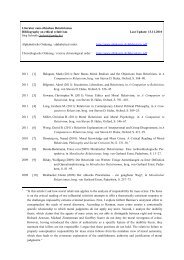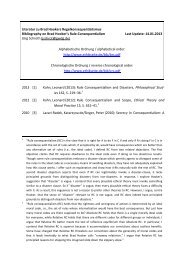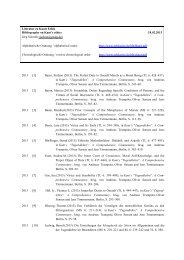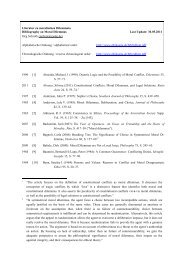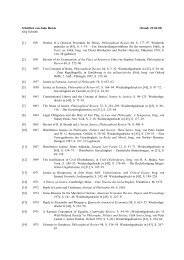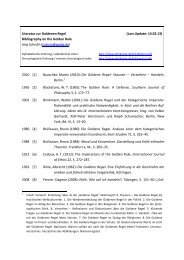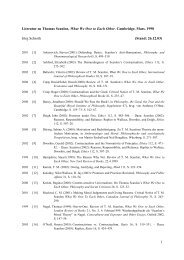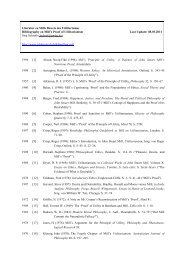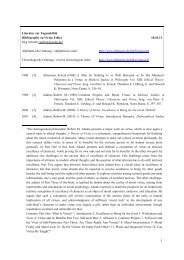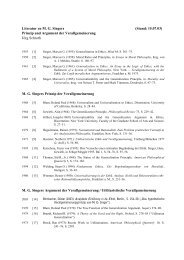Literatur zu Kants Ethik - Ethikseite
Literatur zu Kants Ethik - Ethikseite
Literatur zu Kants Ethik - Ethikseite
You also want an ePaper? Increase the reach of your titles
YUMPU automatically turns print PDFs into web optimized ePapers that Google loves.
1999 [555] James, David N. (1999): Suicide and Stoic Ethics in the Doctrine of Virtue, Kant-Studien 90,<br />
S. 40–58.<br />
1996 [556] Jeske, Diane (1996): Perfection, Happiness, and Duties to Self, American Philosophical<br />
Quarterly 33, S. 263–76. – Vgl. da<strong>zu</strong> [147].<br />
1998 [557] Jeske, Diane (1998): A Defense of Acting from Duty, Journal of Value Inquiry 32, S. 61–74.<br />
1993 [558] Joerden, Jan C. (1993): Was leisten <strong>Kants</strong> Beispiele bei der Anwendung des Kategorischen Imperativs?<br />
Zugleich eine Besprechung von: Christian Schnoor, <strong>Kants</strong> Kategorischer<br />
Imperativ als Kriterium der Richtigkeit des Handelns, Archiv für Rechts- und<br />
Sozialphilosophie 79, S. 247–58. – Zu [1020].<br />
1997 [559] Joerden, Jan C. (1997): Der Widerstreit zweier Gründe der Verbindlichkeit. Konsequenzen<br />
einer These <strong>Kants</strong> für die strafrechtliche Lehre von der „Pflichtenkollision“, Jahrbuch<br />
für Recht und <strong>Ethik</strong> 5, hrsg. von B. Sharon Byrd, Joachim Hruschka und Jan C.<br />
Joerden, S. 43–52.<br />
2005 [560] Joerden, Jan C. (2005): Über ein vermeintes Recht (des Staates) aus Menschenliebe <strong>zu</strong> foltern,<br />
in Jahrbuch für Recht und <strong>Ethik</strong> 13: Philosophia Practica Universalis. Festschrift für<br />
Joachim Hruschka <strong>zu</strong>m 70. Geburtstag, hrsg. von B. Sharon Byrd und Jan C. Joerden,<br />
Berlin, S. 495–525.<br />
2005 [561] Johnson, Andrew B. (2005): Kant’s Empirical Hedonism, Pacific Philosophical Quarterly 86,<br />
S. 50–63. 62 – Zu [922].<br />
1995 [562] Johnson, Darrell (1995): Analytic and Synthetic Method and the Structure of Kant’s<br />
Grounding, in Proceedings of the Eighth International Kant Congress (Memphis),<br />
hrsg. von Hoke Robinson, Milwaukee, Vol. 2, Part 2, S. 613–20.<br />
1993 [563] Johnson, Mark (1993): Moral Imagination. Implications of Cognitive Science for Ethics,<br />
Chicago, S. 65–76 (“Kant’s Metaphoric Morality”).<br />
1996 [564] Johnson, Robert N. (1996): Expressing a Good Will: Kant on the Motive of Duty, Southern<br />
Journal of Philosophy 34, S. 147–168.<br />
1996 [565] Johnson, Robert N. (1996): Kant’s Conception of Merit, Pacific Philosophical Quarterly 77, S.<br />
313–337.<br />
1997 [566] Johnson, Robert N. (1997): Kant’s Conception of Virtue, in Jahrbuch für Recht und <strong>Ethik</strong><br />
Band 5: Themenschwerpunkt: 200 Jahre <strong>Kants</strong> Metaphysik der Sitten, hrsg.<br />
von B. Sharon Byrd, Joachim Hruschka und Jan C. Joerden, Berlin, S. 365–87.<br />
2002 [567] Johnson, Robert N. (2002): Happiness as a Natural End, in Kant’s Metaphysics of Morals.<br />
Interpretative Essays, hrsg. von Mark Timmons, Oxford, S. 317–30.<br />
62 “According to the long orthodox interpretation of Kant’s theory of motivation, Kant recognized only two<br />
fundamental types of motives: moral motives and egoistic, hedonistic motives. Seeking to defend Kant<br />
against the ensuing charges of psychological simplism, Andrews Reath formulated a forceful and seminal<br />
repudiation of this interpretation in his 1989 essay “Hedonism, Heteronomy and Kant’s Principle of<br />
Happiness.” The current paper aims to show that Reath’s popular exegetical alternative is untenable. His<br />
arguments against the traditional view miss the mark, and his revisionist interpretation of Kant's theory of<br />
motivation cannot bear the considerable weight of the countervailing evidence.”



